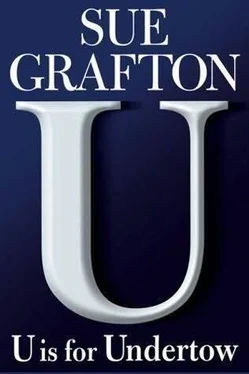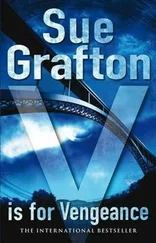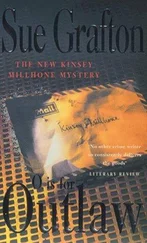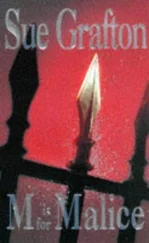I did a few preliminary stretches, keeping an eye on the beach. Ten minutes later I caught sight of Deborah Unruh, approaching from my left. Avis Jent’s description hadn’t prepared me for how attractive she was. She was barefoot and the wind had buffeted her silver hair into a choppy halo. She had to be in her late sixties, looking trim and fit in black velour pants with a matching jacket that she’d left unzipped, showing a red cotton T-shirt. Her eyes were brown and her face was youthful, despite numerous soft lines that came into focus as she reached me. “Kinsey?”
“Hi, Deborah.” I reached out and the two of us shook hands. “Thanks for meeting me on such short notice.”
“Not a problem. I’m just happy I wasn’t asked to give up my afternoon walk. I usually go as far as the wharf and back if that’s doable for you.”
“Absolutely. What’s that, four miles round trip?”
“Close enough.”
I took a minute to pull off my running shoes and socks. The socks I stuffed in my jacket pockets. I tied my shoelaces together and hung my shoes around my neck, letting them dangle in back. I wasn’t crazy about the persistent bump-bumping between my shoulder blades as we trudged through the soft sand, but it was better than walking fully shod.
She was already moving toward the surf at a pace I might have found daunting if I hadn’t been faithful to my jogging routine. On the ocean, waves broke a dozen yards out, and once we reached the hard pack, the water rushed forward in an icy flurry, covering our feet with foam before sliding out again. The Pacific is cold and unforgiving. You can usually spot a few hardy souls swimming in its depths, but no one had braved it that day. Two sailboats tacked toward the islands and a speedboat, at full throttle, paralleled the shoreline, keeping a para-sailor aloft, attached by a towrope scarcely visible against the pale blue sky. Hang gliding and parasailing are second and third down on my list of the one thousand things I never want to do in life. The first is have another tetanus shot.
Deborah said, “I understand this whole business originated with Michael Sutton. What’s the nature of your relationship?”
“I wouldn’t call it a relationship,” I said. “I met him for the first time a week ago when he hired me for a day’s work.”
I sketched in the situation, starting with his appearance in my office and his story about the two pirates he’d seen in the woods. “They claimed they were digging for buried treasure, but he noticed a bundle on the ground nearby. A few weeks ago, he came across a reference to the Fitzhugh kidnapping and the penny dropped. Now he’s convinced he saw Mary Claire’s body wrapped for burial. The only snag is when the police excavated the site, they found a dead dog. According to the ID tag, his name was Ulf.”
She seemed taken aback. “Well, that’s bizarre. I can assure you he wasn’t ours.”
“I know. I drove to Puerto and talked to the man who owned him. He said he’d taken Ulf to Dr. McNally for hip dysplasia. X-rays revealed a nasty tumor instead and the vet recommended euthanasia. Someone removed the dog’s remains from a shed at the rear of the clinic and transported the body to your property, where they buried him.”
The look she turned on me was perplexed. “Pardon my skepticism, but it sounds like all of this is predicated on the notion that it was Mary Claire’s body he saw. What makes you so sure? It seems like folly to operate on the idea when all you have is his word for it.”
“Agreed. I’m not even sure we could say we had his word on it. Call it a hunch.”
“Call it anything you like, it’s still odd. If something went wrong in the course of the kidnapping and they had to dispose of her body, why would they bury her in our yard when Horton Ravine has acres of woods?”
“I’ve been asking myself the same question. If we’re lucky we’ll find answers. On the other hand, we may never know.”
“There’s a certain irony in here somewhere. I haven’t heard Michael’s name in years. His parents, Kip and Annabelle, were our best friends.”
I looked over at her with interest. “Really. Michael’s parents? When was this?”
“During that same period. We met at the country club when she was six months pregnant with him. They were the dearest people in the world. I lost Annabelle, Kip, and Patrick in a span of two years.”
“Avis told me your husband died in a plane crash,” I said. I was reluctant to bring up the subject of his death, but it seemed to me the conversation we were embarking on had better be rooted in reality. The fact that we were walking, with our attention directed outward, allowed a more intimate exchange than if we’d been chatting eye-to-eye over a cup of tea.
“Some days I think I’m reconciled, that I’ve dealt with the pain and it’s over and done. Other days the grief is just as fresh as it was the first moment I heard.”
“What were the circumstances?”
“Rain was just starting graduate school, working toward her master’s degree in social work at the University of Wisconsin, Milwaukee. This was the fall of 1985. She and Patrick drove out in her car, with all her stuff in a four-by-eight cargo trailer. His plan was to get her settled and then fly on to Atlanta for a business meeting. I’d have gone with him, but it made more sense for me to tend the home fires and let the two of them have the time together. The Midwest Express flight to Atlanta went down after takeoff. The right engine failed and then a whole series of things went haywire. I was here in California without any intuition whatever. It’s hard to realize your life can change so radically with no warning at all. When Rain phoned, she couldn’t even speak. I thought it was a crank call and nearly hung up on her.”
“I don’t know how anyone gets through something like that.”
“You do because you do. Because you have no choice. I had Rain to consider. I set my own pain aside and focused on helping her.”
“Tell me the time frame. I heard about Michael’s accusations against his parents.”
“The lawsuit was settled in 1981. By then, Kip and Annabelle were crippled by the strain. Between the public outcry and the drain on their emotions, they were whipped. Let’s not even talk about the thousands of dollars in legal fees it cost them. Annabelle died in the summer of 1983, and Kip six months later.”
“They must have been a mess after what he put them through.”
“You have no idea. The four of us talked about it for hours on end and there was just no way out. Suing his therapist was their only hope of putting a stop to it. Even when it was over, the bad feelings remained. Some people were convinced he was actually abused, even after Marty Osborne as good as admitted the whole of it was her doing. The general attitude seemed to be that if Kip and Annabelle were accused, there must be a grain of truth to it. Both drank. I’m not saying they were alcoholics, but they hit the bottle pretty hard at times. Patrick and I were in much the same boat. We called it ‘social’ drinking, but we were social every chance we got. When this came up, they couldn’t suck down the martinis fast enough, and that set tongues to wagging on top of everything else. At the club, feelings ran so high, the four of us resigned. That’s how bad it got. I still run into people who refuse to make eye contact. They know Patrick and I were loyal, which apparently put us on the same dung heap as the Suttons, like we were somehow guilty by association.”
“Diana told me Michael recanted.”
She shook her head in disgust. “That was the last straw. I wanted to kill the little shit. Patrick and I were incensed, absolutely livid. Not that it made a whit of difference. Kip and Annabelle were both gone by then and the damage was done.”
Читать дальше












